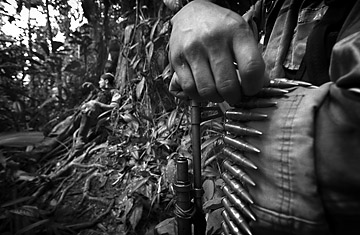
Members of a FARC unit patrol a jungle near the Pacific coast of Colombia.
(3 of 3)
At the time of their capture, all three men had been working for Northrop Grumman, a defense contractor, which continues to pay the families their salaries. Former Grumman pilots have criticized the company for using single-engine planes over such dangerous turf. In March 2003, three Grumman employees died in a single-engine-plane crash during a search for the hostages. (The U.S. now requires that twin-engine aircraft be used there.) But the hostages' families ask why the Bush Administration didn't provide more military backup on the contractors' Colombian missions. "Did they really never think this sort of thing could happen?" asks Gonsalves' mother Jo Rosano, of Bristol, Conn. "They sent civilians into a place they knew the rebels would be, and we get the impression they don't care." Rosano and others credit the new U.S. ambassador to Colombia, William Brownfield, with bringing urgency to the case. "We need to remind Americans," Brownfield says, "that three of their own are being held in abominable conditions that violate every conceivable standard of international human-rights law."
The Americans' captivity is part of the broader haggling between the Colombian government and the FARC over how to revive peace talks in a four-decade-old civil war that has left some 40,000 dead and millions more displaced. Racked by social inequities, Colombia has endured internecine violence for much of the past 100 years. "The FARC are like fish born in a tank that remains their entire world," says Colombia's Foreign Minister Fernando Araujo, who was a hostage for six years before escaping in 2006. "They're convinced they have the right to violently terrorize others." But the same is often said of his country's military, long accused of killing innocent rural civilians and fostering right-wing, cocaine-trafficking paramilitary armies, vicious groups the government has only recently begun to dismantle. As a result, some in the U.S. Congress are balking at a free-trade pact with Colombia.
Since taking office in 2002, Uribe has made impressive progress with Colombia's security and economy. But there is scant contact between him and the FARC, which is far from vanquished. "I'm killing myself every day wondering why dialogue is so impossible for all sides in this tragedy," says Betancourt's mother Yolanda Pulecio. At least Betancourt is a cause celebre in France. In their jungle encampments, America's hostages in Colombia are not just out of sight; to all but their families and supporters, they seem to be out of mind too. With reporting by Sibylla Brodzinsky/Bogota and Bruce Crumley/Paris
